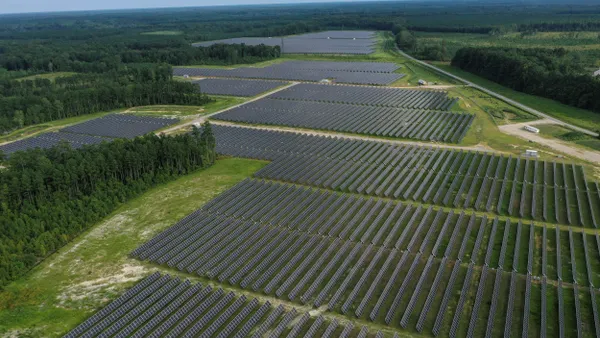Dive Brief:
- Former managers at Sunrun told The Wall Street Journal that they delayed reporting canceled projects in the months surrounding the company's 2015 initial public offering (IPO), potentially giving a boost to sales figures.
- The U.S. Securities and Exchange Commission is probing both Sunrun and Tesla to determine whether they are adequately disclosing customer solar project cancellations. The SEC issued a subpoena to Sunrun earlier this month.
- Sunrun officials told the paper an internal review revealed "no evidence that our sales employees changed cancellation dates in our systems to delay the reporting of cancellations.” The company went public in August 2015 with an initial price of $14/share. It currently trades around $5.
Dive Insight:
Sunrun continues to face scrutiny over its customer cancellations as former employees tell the Wall Street Journal the residential solar company might have delayed releasing cancellation information in an attempt to manipulate sales numbers.
"The big internal push was to cram as many sales as we could through the pipeline,” Darren Jennings told the Journal. He was a regional sales manager for Sunrun in Hawaii for about two years and left the company earlier this year.
From May 2015 to October 2015, Jennings said cancellations in Hawaii reached as high as 40%, or about 200 contracts. The company went public during that period, in August of 2015.
Sunrun cancellations early this year continue to be as high as 40%, unnamed sources told the paper. At SolarCity, owned by Tesla, cancellations reached half of all orders in early 2016, according to other anonymous sources.
Sunrun CEO Lynn Jurich declined an interview for the WSJ article, but said in a statement the company did not uncover any evidence pointing to employees changing cancellation dates to delay reporting sales numbers.
Jurich last week addressed the WSJ articles at GTM Research's annual Solar Summit, saying initial articles over cancellation numbers were misleading.
"I think the sales process has been misunderstood," she told the crowd.
Under the current sales scheme, customers sign an initial contract before the more detailed installation process occurs. Early-stage cancellations are more common, she said, but acknowledged the custom design portion of the sales process could be clarified.
Cancellation numbers are a popular investor tool to gauge the company's health, but many solar companies do not disclose the actual numbers in earnings calls and reports.
“We only provide guidance on installations and not on bookings and we have been within 1% of our annual guidance to investors in both 2015 and 2016 when we have been public," a Sunrun spokesperson told Bloomberg earlier this month. Sunrun installed 282 MW of solar in 2016, 3 MW short of forecasted installations.
The SEC's investigation comes at a difficult moment for larger solar companies struggling to compete against smaller installers. In the first three months of this year SolarCity only installed 150 MW, a 25% drop compared to the previous quarter. The company is streamlining its solar business by dropping door-to-door sales and halting advertising.
Sunrun, on the other hand, appears to be bucking those trends, with Q1 2017 installations up 21% over the previous period in 2016. But the company still forecasted a lower growth number compared to previous years, a possible consequence of customer cancellations.














